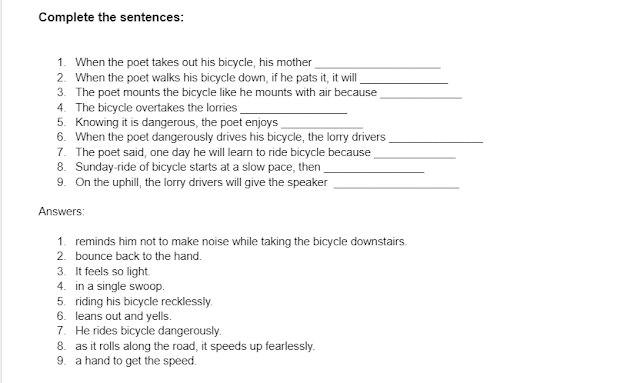On a Bicycle Summery, Line-by-Line Explanations & Question-Answer
Summary of "On a Bicycle" by Yevgeny Yevtushenko
The poem "On a Bicycle" by Yevgeny Yevtushenko is a vivid, energetic portrayal of a young rider's exhilarating experience on a bicycle. The poem captures the joy, freedom, and slight recklessness of youth, as well as the close bond the speaker shares with their bicycle. Through dynamic imagery and playful language, Yevtushenko evokes the thrill of the ride and the carefree spirit of the speaker.
Line-by-Line Explanation
Here's a line-by-line explanation of the poem "On a Bicycle" by Yevgeny Yevtushenko:
1. "Under the dawn I wake my two-wheel friend."
- The poem begins with the speaker waking up early in the morning, just as dawn is breaking. The "two-wheel friend" refers to the bicycle, personified as a companion. This shows the close bond and affection the speaker has for the bicycle.
2. "Shouting in bed my mother says to me, 'Mind you don't clatter it going downstairs!'"
- The speaker’s mother, still in bed, reminds him not to make noise while taking the bicycle downstairs. This adds a realistic touch, showing the daily routine and the mother's concern.
3. "I walk him down, he springing step to step:"
- The speaker carefully takes the bicycle downstairs, with "springing step to step" suggesting a lively and energetic movement. The use of "him" continues the personification of the bicycle.
4. "Those tyres he has, If you pat him flat-handed he'll bounce your hand."
- This line describes the tires of the bicycle, emphasizing their firmness and quality. The image of the tire bouncing back when patted reflects the readiness and responsiveness of the bicycle.
5. "I mount with an air and as light a pair of legs as you'll encounter,"
- The speaker confidently mounts the bicycle, feeling light and free. The phrase "as light a pair of legs as you'll encounter" suggests the ease and agility with which the speaker rides.
6. "slow into Sunday ride out of the gates, roll along asphalt, press down on the pedals, speeding, fearless, ring, ring, ring."
- The speaker starts a leisurely Sunday ride, leaving the gates of home and rolling along the road. The line captures the gradual acceleration and the carefree, fearless nature of the ride, punctuated by the joyful ringing of the bicycle bell.
7. "Flinging along my happiness my fever, incapable of breaking out of it,"
- The speaker expresses the overwhelming joy and excitement of the ride. The word "fever" suggests an intense passion or energy that the speaker feels, which they are unable to escape.
8. "overtaking the lorries on the road taking each of them in a single swoop flying behind them through cut open space hanging on them uphill."
- The speaker boldly overtakes trucks ("lorries") on the road, moving swiftly and effortlessly. "Cut open space" suggests the open road and the freedom it offers. The speaker even stays close behind the trucks while going uphill, perhaps using their momentum for an easier climb.
9. "Yes I know. It's dangerous. I enjoy it."
- The speaker acknowledges the risks of riding so boldly, especially overtaking trucks, but admits that the thrill of the danger adds to the enjoyment.
10. "They hoot And lean out and yell out: 'We'll give you a hand on the hills; give you some speed; after that you tear along on your own.'"
- The truck drivers honk ("hoot") and shout encouragement to the speaker, offering to help by letting the speaker ride in their slipstream ("give you some speed"). This camaraderie shows a sense of community and mutual support on the road.
11. "Careering full tilt, pelting along in a flurry of jokes."
- The speaker continues to ride at full speed, enjoying the rush and the playful interaction with the truck drivers. The "flurry of jokes" suggests a light-hearted, carefree atmosphere.
12. "Turn a blind eye to my crazy career; it's the fashion."
- The speaker acknowledges that their wild, reckless riding style might seem crazy to others, but brushes it off, implying that such behaviour is typical or fashionable among young riders.
13. "You can't tell me how terribly I ride. One day I'll learn how to ride."
- The poem concludes with the speaker defiantly stating that no one can criticize their riding style. The final line, "One day I'll learn how to ride," is ironic, as the speaker is clearly skilled but perhaps hints at a deeper understanding or maturity that they will gain with time.
On a Bicycle MCQ : FIND HERE
On a Bicycle Question-Answer:
THANK YOU!








No comments:
Post a Comment